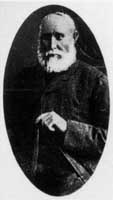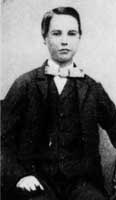Life Story of Sir Thomas Lipton
Early Life
Thomas Johnston Lipton was born on May 10th 1850, the youngest of five children. His parents, Thomas senior and Frances, had emigrated in the 1840s to Scotland from Shannock Mills near Clones in Northern Ireland. The family lived in a four room tenement at 10 Crown Street, Hutchesontown. It was a typical "respectable working class" home.



He attended St. Andrew's Parish School where primary education cost threepence a week. Although not academically inclined, he mastered the three Rs. He and his friends formed a club which raced toy yachts on the pools of High Fields near Crown Street and around this time he carved and rigged Shamrock, his first model boat.
He left school in November 1860 and soon began his first job in A & W Kennedy, Stationers in Glassford Street receiving a wage of half-a-crown. However, looking to move up in the business world, he perceived this to be a dead end job. His next job was at Messrs. Tillie & Henderson in Miller Street. The job of cutting of shirt patterns was extremely dull but he doubled his wage to four shillings a week. His early working life wasn't without incident. After fighting with another boy in the pattern department when asked to explain himself to his boss he answered "I hit him, sir because he cut the toorie aff me bonnet". (Lipton, p56) He was soon showing his confidence by asking for a 25% increase which was refused with the answer: "You are getting as much as you are worth and are in a devil of a hurry asking for a rise". (Lipton, p56)
After this terse refusal he lost the little interest he had in the job and soon found another working as a cabin boy on the Burns Line between Glasgow and Belfast which earned him a wage of eight shillings a week. He was enthralled with the job "...it was good to be alive and better still to be a cabin-boy on a gallant Clyde-built steamship". (Lipton, p61)
He claimed he was "never happier...than when in the atmosphere of ships, sailors, boats and the waterside generally" (Lipton, p59). While his love of water and boats continued throughout his life, his job at the Burns Line didn't last: he was given a week's notice for allowing a cabin lamp to smoke and discolour the white enamel of the ceiling.
